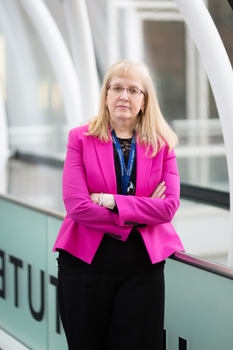Early mobilization can be replicated and benefit patients across different clinical units, study suggests

By Ana Gajic

Dr. Sharon Straus
Early mobilization can be tailored to many different clinical contexts with the same benefits to patient mobility, suggests a study led by St. Michael’s Hospital researchers and recently published in BMC Geriatrics.
“When we admit older adults to acute care hospitals, the first thing we often do is put them to bed – and we don’t routinely assess and optimize their mobility from the date of admission,” said Dr. Sharon Straus, interim physician-in-chief at St. Michael’s and director of the Knowledge Translation Program at the Li Ka Shing Knowledge Institute.
“If they aren’t mobilized in hospital, they can lose their ability to participate in their activities of daily living and this can impact their quality of life and ability to return to independent living in the community.”
The team set out to tailor, implement, and evaluate the effect of an early mobilization program called Mobilization of Vulnerable Elders (MOVE) on surgery, psychiatry, medicine, and cardiology inpatient units.
The study found that with tailoring, MOVE could successfully be implemented in several inpatient units. Patients’ mobility increased during and after the intervention and declined during the sustainability phase in some sites.
“One of the limitations of studies is that people often say that a specific intervention won’t work in their setting because the setting is different, the patients are different,” said Dr. Straus. “We’ve been able to demonstrate that this intervention can be replicated in different settings with different populations.”
This study was part of an effort to scale up an original study on MOVE, which promotes early mobilization in patients 65 years of age and older admitted to internal medicine units. This new study was conducted between December 2013 and October 2014 and included 16 units across seven academically-affiliated hospitals in Ontario. Units ranged from psychiatry units, to surgery, to cardiology.
Based on these findings, Dr. Straus and her team hope to continue to scale MOVE to other provinces and countries.
About St. Michael’s Hospital
St. Michael’s Hospital provides compassionate care to all who enter its doors. The hospital also provides outstanding medical education to future health care professionals in more than 27 academic disciplines. Critical care and trauma, heart disease, neurosurgery, diabetes, cancer care, care of the homeless and global health are among the Hospital’s recognized areas of expertise. Through the Keenan Research Centre and the Li Ka Shing International Healthcare Education Centre, which make up the Li Ka Shing Knowledge Institute, research and education at St. Michael’s Hospital are recognized and make an impact around the world. Founded in 1892, the hospital is fully affiliated with the University of Toronto.
About Unity Health Toronto
Unity Health Toronto, comprised of Providence Healthcare, St. Joseph’s Health Centre and St. Michael’s Hospital, works to advance the health of everyone in our urban communities and beyond. Our health network serves patients, residents and clients across the full spectrum of care, spanning primary care, secondary community care, tertiary and quaternary care services to post-acute through rehabilitation, palliative care and long-term care, while investing in world-class research and education. For more information, visit www.unityhealth.to.
